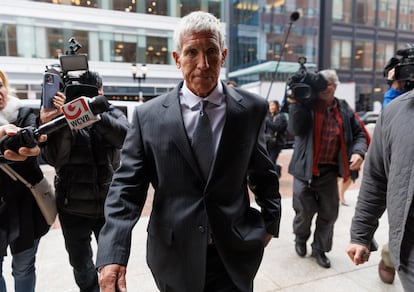Mastermind of ‘Varsity Blues’ US college entrance scam handed 3.5 years
William ‘Rick’ Singer created a network that falsified academic and athletic results and bribed university employees to admit children of wealthy clients to top US institutions

A federal court in Boston sentenced William “Rick” Singer to three and a half years in jail after finding the 62-year-old guilty of heading up a scheme that offered places at elite universities for sale to wealthy families. Singer’s network, which was dismantled by the FBI’s “Operation Varsity Blues,” is to date the largest string of the web engulfing the world of higher education in the United States to be unraveled. The investigation, which was launched in 2018 and conducted over three years, lifted the lid on just how far privileged families are willing to go to ensure their offspring gain entry to the country’s top institutions, sometimes spending millions of dollars to do so.
The punishment handed down to Singer is the longest sentence to date in the sprawling scandal that embarrassed some of the US’ most prestigious universities and put a spotlight on the secretive admissions system already seen as rigged in favor of the rich.
Singer was accused by prosecutors of being the mastermind behind the scheme, which as he himself liked to say opened a “parallel” path to university acceptance for the children of wealthy families and which, according to the charges brought against him, “tremendously corrupted the integrity of the admissions process.” Among the services offered by Singer was paying off entrance exam administrators and coaches to get often undeserving students into elite schools with inflated test scores and bogus athletic credentials.
Between 2011 and 2019, Singer received around $25 million from wealthy parents and lived in a vast mansion in Orange County, California. After his arrest, he moved to a trailer park in Florida.
Among the methods Singer employed to ensure entrance at universities including Georgetown, UCLA, Yale and Stanford were faking SAT and ACT scores or arranging for someone else to take the tests for the children of his clients. Another path was the sporting one: through falsifications and bribes he persuaded coaches to accept students who on paper appeared to be athletes of exceptional quality. In one extremely complex case – which cost the parents $1.2 million – Singer created an entire background of rowing prowess for a female student, including a fictitious string of victories, staged photographs and a forged recommendation from a Chinese school that certified she had trained and studied there.
In 2019, Singer pleaded guilty to charges including racketeering conspiracy, money laundering conspiracy, conspiracy to defraud the United States and obstruction of justice. During the FBI investigation he actively cooperated and provided information on a client list that included executives at some of the biggest companies in the US and celebrities such as actresses Lori Loughlin and Felicity Huffman. Coaches from schools including Yale, Stanford, Georgetown and UCLA admitted to accepting bribes.
Varsity Blues case ‘something out of a Hollywood movie’
Prosecutors had sought six years behind bars, noting Singer’s extensive cooperation that helped authorities unravel the entire scheme. Singer began secretly working with investigators in 2018 and recorded hundreds of phone calls and meetings that helped authorities build the case against dozens of parents, athletic coaches and others who were arrested in an FBI swoop in March 2019.
“The conduct in this case was something out of a Hollywood movie,” Massachusetts US Attorney Rachael Rollins told reporters after the sentencing.
Singer also was ordered to pay more than $10 million in restitution to the IRS and forfeit millions more in money and assets to the government. He was ordered to report to prison in February.
In seeking leniency for Singer, defense attorney Candice Fields told the judge that her client took great personal risk by wearing a wire to record meetings for investigators and “did whatever was necessary” to assist the government. Fields had requested three years of probation, or if the judge deemed prison time necessary, six months behind bars.
“The investigation only achieved the notoriety it did because dozens of influential and sometimes celebrity defendants were prosecuted” and that only happened because of Singer, Fields said.
Singer apologized to his family, the schools he embarrassed in the public eye and the students he worked with over the years. He promised to spend the rest of his life working to make a positive impact in people’s lives. “My moral compass was warped by the lessons my father taught me about competition. I embraced his belief that embellishing or even lying to win was acceptable as long as there was victory. I should have known better,” he said.
Sign up for our weekly newsletter to get more English-language news coverage from EL PAÍS USA Edition
Tu suscripción se está usando en otro dispositivo
¿Quieres añadir otro usuario a tu suscripción?
Si continúas leyendo en este dispositivo, no se podrá leer en el otro.
FlechaTu suscripción se está usando en otro dispositivo y solo puedes acceder a EL PAÍS desde un dispositivo a la vez.
Si quieres compartir tu cuenta, cambia tu suscripción a la modalidad Premium, así podrás añadir otro usuario. Cada uno accederá con su propia cuenta de email, lo que os permitirá personalizar vuestra experiencia en EL PAÍS.
¿Tienes una suscripción de empresa? Accede aquí para contratar más cuentas.
En el caso de no saber quién está usando tu cuenta, te recomendamos cambiar tu contraseña aquí.
Si decides continuar compartiendo tu cuenta, este mensaje se mostrará en tu dispositivo y en el de la otra persona que está usando tu cuenta de forma indefinida, afectando a tu experiencia de lectura. Puedes consultar aquí los términos y condiciones de la suscripción digital.








































